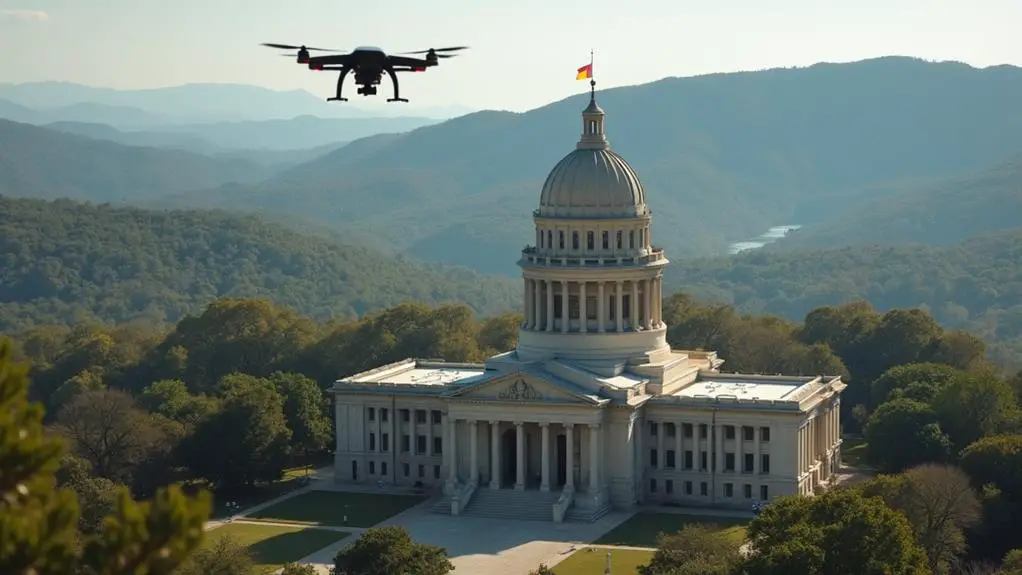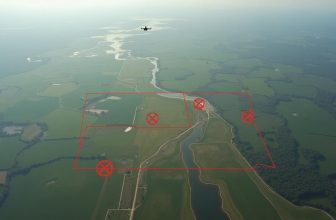
If you’re a drone enthusiast or a business owner looking to incorporate drones into your operations in Arkansas, you need to be aware of the state’s complex drone laws. While the Federal Aviation Administration (FAA) sets the foundation for drone regulations nationwide, Arkansas has its own set of rules to safeguard public safety and protect individual privacy. From restrictions on aerial surveillance to requirements for recreational and commercial use, understanding these laws is vital to avoid costly fines and penalties. But what exactly does compliance look like, and how can you guarantee you’re flying on the right side of the law?
Contents
- 1 Key Takeaways
- 2 Federal Drone Regulations Overview
- 3 Arkansas State Drone Laws
- 4 Recreational Drone Use Rules
- 5 Commercial Drone Operation Laws
- 6 Drone No Fly Zones in Arkansas
- 7 Registration and Permit Requirements
- 8 Penalties for Drone Law Violations
- 9 Frequently Asked Questions: Drone Laws in Arkansas
- 10 Conclusion
Key Takeaways
- Arkansas drone laws govern operations, supplementing federal FAA regulations and addressing state-specific concerns, such as privacy and trespassing.
- Recreational drone operators must respect private property rights, avoid sensitive areas, and not intentionally spy on individuals.
- Commercial drone operators in Arkansas must comply with federal Part 107 regulations and obtain necessary permissions and certifications.
- Drone no-fly zones in Arkansas include areas around airports, military bases, national parks, power plants, and correctional facilities.
- Failure to comply with Arkansas drone regulations can result in fines ranging from $1,000 to $5,000 and potential jail time for severe offenses.
Federal Drone Regulations Overview
The Federal Aviation Administration (FAA) regulates drone operations in the United States through a set of rules and guidelines that aim to guarantee public safety and national security.
You must follow these regulations when operating a drone, regardless of whether it’s for recreational or commercial purposes. The FAA requires drone operators to register their drones if they weigh more than 0.55 pounds and less than 55 pounds, and to follow specific guidelines for drone safety.
When it comes to aerial surveillance, you must obtain permission from the FAA before conducting any surveillance activities.
You’ll need to provide detailed information about your mission, including the location, time, and purpose of the flight. The FAA also requires you to follow specific rules for operating drones in populated areas, such as maintaining a safe distance from people and structures.
Additionally, the FAA requires you to be aware of airspace restrictions, such as those near airports or national parks.
You can check the FAA’s website for up-to-date information on airspace restrictions and other drone safety guidelines.
Arkansas State Drone Laws
Several state laws govern drone operations in Arkansas, supplementing the federal regulations set by the FAA.
As you navigate the state’s drone regulations, you’ll find that the Arkansas legislature has enacted several laws addressing the use of drones within state boundaries.
One key area of concern is state privacy. Arkansas law prohibits using a drone to capture images of individuals or private property without consent, with some exceptions.
For instance, you’re allowed to capture images of public events or gatherings where individuals have no reasonable expectation of privacy.
However, you mustn’t use a drone to intentionally capture images of individuals in private areas, such as backyards or homes, without their consent.
Additionally, Arkansas law requires law enforcement agencies to obtain a warrant before using a drone for surveillance, with some exceptions.
You should also be aware of other state laws that may affect your drone operations, such as those related to trespassing and property rights.
Recreational Drone Use Rules
Arkansas state laws also govern recreational drone use, particularly concerning drone safety and personal privacy.
You’re prohibited from flying your drone over or near sensitive areas, such as prisons, schools, or areas with sensitive infrastructure.
In addition, you’re not allowed to use your drone to intentionally spy on or photograph individuals in a way that invades their personal privacy.
You’re also required to respect private property rights and obtain permission before flying your drone over private property.
By following these rules, you can guarantee safe and responsible recreational drone use in Arkansas.
Always check with local authorities for specific rules and regulations in your area.
Commercial Drone Operation Laws
Operating a drone for commercial purposes in Arkansas requires compliance with state and federal regulations.
You must register your drone with the Federal Aviation Administration (FAA) and obtain a Part 107 remote pilot certification. This certification involves passing a knowledge test and undergoing a background check by the Transportation Security Administration (TSA).
When planning commercial drone operations, you should verify you have the necessary permissions and follow strict flight planning guidelines.
You must conduct a thorough risk assessment and create a detailed flight plan, taking into account factors such as weather conditions, air traffic, and potential hazards.
Additionally, you’re required to have drone insurance that covers liability for damages or injuries caused by your drone.
Arkansas law also requires you to maintain records of your drone operations, including flight plans, maintenance logs, and incident reports.
It’s essential to stay up-to-date with changing regulations and guarantee you’re in compliance with all state and federal requirements to avoid fines and penalties.
Drone No Fly Zones in Arkansas
When traversing Arkansas airspace with your drone, you’ll need to be aware of specific no-fly zones to avoid violating federal and state regulations.
Arkansas has several no-fly zones, including areas around airports, military bases, and national parks.
The Federal Aviation Administration (FAA) restricts drone operations near airports to guarantee safe takeoffs and landings.
Additionally, drone flights are prohibited in or around Arkansas’ national parks, such as Hot Springs National Park and Buffalo National River, to protect wildlife and park visitors.
Airspace restrictions in Arkansas also include areas around power plants, correctional facilities, and other sensitive infrastructure.
It’s crucial to check the FAA’s B4UFLY app or website for up-to-date information on airspace restrictions before flying your drone.
You can also check with local authorities for any additional restrictions that may apply.
By being aware of these no-fly zones, you can guarantee safe and compliant drone operations in Arkansas.
Remember to always follow federal and state regulations to avoid fines or penalties.
Registration and Permit Requirements
As you prepare to take to the skies with your drone in Arkansas, you’ll need to navigate the state’s registration and permit requirements to guarantee you’re flying by the book.
The Federal Aviation Administration (FAA) requires registration for drones weighing between 0.55 and 55 pounds, including payloads. If your drone weighs more than 55 pounds, you’ll need to obtain a special airworthiness certificate.
You can register your drone online through the FAA’s website. If you’re a foreign drone operator, you’ll need to obtain a Foreign Registration certificate before flying in Arkansas.
When registering, you’ll need to provide your name, email address, and physical address. You’ll also need to pay a registration fee of $5 per drone.
While not required by law, it’s recommended that you obtain drone insurance to protect yourself and others in case of an accident.
Many drone insurance policies also cover damage to your drone. Make sure to carefully review the terms and conditions of any insurance policy before purchasing.
Penalties for Drone Law Violations
You’ve taken the necessary steps to register your drone and are ready to take to the skies in Arkansas. However, it’s vital to be aware of the penalties for violating drone laws in the state.
If you fail to comply with Arkansas drone regulations, you may face Drone Fines ranging from $1,000 to $5,000 for each offense.
Violations include operating a drone in no-fly zones, such as national parks or near airports, without proper authorization.
You may also be fined for conducting aerial surveillance without the consent of the person or property being surveilled.
Additionally, flying a drone that weighs more than 0.55 pounds without registering it with the Federal Aviation Administration (FAA) can result in penalties.
In severe cases, such as reckless endangerment or interfering with emergency responders, you may face jail time and higher fines.
Imperative to familiarize yourself with Arkansas drone laws and regulations to avoid these penalties.
By doing so, you can guarantee a safe and enjoyable experience while flying your drone in the state.
Always follow the rules and respect the privacy of others to avoid Drone Fines and other consequences.
Frequently Asked Questions: Drone Laws in Arkansas
Can I Fly a Drone Over a Neighbor’s Property in Arkansas?
When flying a drone over a neighbor’s property, you’ll likely face private property and potential neighbor disputes issues. In Arkansas, you must respect aerial trespass laws, obtain consent, or guarantee you’re not invading private airspace.
Do Arkansas Drone Laws Apply to Model Airplanes?
Like Icarus testing the skies, you’re wondering if model airplane regulations apply to you. In Arkansas, model regulations typically exempt hobbyists, but you’ll need to verify your model airplane meets FAA hobby exemptions to avoid potential penalties.
Can I Use a Drone for Filmmaking in Arkansas State Parks?
When filming in Arkansas state parks with a drone, you’ll need to check state permits and filming regulations. Obtain necessary permits, follow park rules, and guarantee adherence to state regulations to capture footage smoothly.
Are Drones Allowed in Arkansas Wildlife Management Areas?
You’re about to release a swarm of drones on Arkansas. But, seriously, in wildlife management areas, you’re generally allowed to fly drones for activities like wildlife surveillance and conservation efforts, with permits and restrictions applying.
Can I Fly a Drone Near Arkansas Correctional Facilities?
You’re unlikely to fly a drone near correctional facilities due to Prison Security concerns. Facility boundaries are typically restricted airspace, and flying a drone within or near these areas may pose a security risk, requiring permission.
Conclusion
As you take to Arkansas’ skies with your drone, remember the laws governing your flight path are a safeguard, not a straitjacket. Federal and state regulations form a delicate balance between freedom and responsibility, protecting both your right to fly and others’ right to privacy. By piloting these rules, you’ll avoid turbulence and guarantee a smooth, lawful flight, with the Natural State’s stunning landscapes unfolding before your lens.






